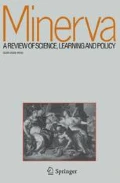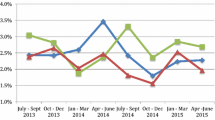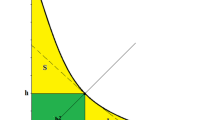Abstract
We analyze the prestige of 1,500 scholars in economics, sociology, and management who have Spanish and French institutional affiliations operationalized by their h-index in Scopus and Google Scholar. We use a negative binomial count model to examine how some individual factors affect the h-index from both databases. The results show a non-monotonic relationship between the researchers’ career length and their h-index. There is a positive and statistically significant relationship between total research output and the h-index. The share of publications in English over total publications has also a positive and statistically significant effect on the h-index, except in a single case, while the share of publications in other foreign languages does not have such effect. Finally, we found that the effects of the number of citations received by documents in English (international impact) and by those in the vernacular language (local or regional impact) on the h-index vary according to the database, the country, and the discipline in question.
Similar content being viewed by others
Notes
While GS data for individual scientists may not be as comprehensive as the list of publications in a CV, in most cases the coverage is almost complete as shown by García Pérez (2010) for the case of four Spanish psychologists.
The AERES has been replaced by the HCERES (Haut Conseil de l'évaluation de la recherche et de l'enseignement supérieur) from whose website (http://www.hceres.fr) we obtained the reports for classifying the French doctoral schools.
For instance, in some cases, the same researcher publishes with a double surname in Spanish journals and with a single surname in foreign journals.
Besides, in some local journals, the titles of published articles appear both in English and in the vernacular language; and both could be retrieved by GS as individual entries. In these cases, we consolidated the entries, assigning the language of full-text publication to the article. In contrast, when complete versions of the same article were published in English and in the vernacular language, we took them as separate entries.
The number of observations is slightly less than 250 in some disciplines because a few social scientists do not have publications (articles, books or chapters) in their GS research output.
The increasing importance of the “publish or perish” imperative, particularly in journals published in English, is considered by some authors as leading to changes in research agendas, especially against those of a more contextualized (local or regional) nature that are deemed relevant for scientists in non-Anglophone and developing countries (Bianco et al. 2016).
It could also be contended that more senior researchers have made many publications not detected by GS. Nevertheless, books and chapter with even minimum impact may indeed be captured by GS. If a book or chapter is cited in the full text of a GS-indexed document, then GS retrieves it as a “citation”, and the document thus appears as an entry in the author’s research output generated by the Publish or Perish software.
References
Abend, Gabriel. 2016. Styles of sociological thought: Sociologies, epistemologies, and the Mexican and U.S. quests for truth. Sociological Theory 24(1): 1–41.
Aggeri, Franck. 2016. L’obsession de la productivité et la fabrique du chercheur publiant. Le Libellio d’Aegis 12(2): 21–32.
Allison, Paul, and J. Scott Long. 1990. Departmental effects on scientific productivity. American Sociological Review 55: 469–478.
Archambault, Eric, Etienne Vignola-Gagne, Grégoire Cote, Vincent Lariviere, and Yves Gingras. 2006. Benchmarking scientific output in the social sciences and humanities: The limits of existing databases. Scientometrics 68(3): 329–342.
Beigel, Fernanda. 2014. Publishing from the periphery: Structural heterogeneity and segmented circuits. The evaluation of scientific publications for tenure in Argentina’s CONICET. Current Sociology 62(5): 743–765.
Beigel, Fernanda, and Maximiliano Salatino. 2015. Circuitos segmentados de consagración académica: las revistas de Ciencias Sociales y Humanas en la Argentina. Información, cultura y sociedad 32: 11–36.
Bianco, Mariela, Natalia Gras, and Judith Sutz. 2016. Academic Evaluation: Universal Instrument? Tool for Development? Minerva 54(4): 399–421.
Blau, Judith. 1976. Scientific Recognition: Academic Context and Professional Role. Social Studies of Science 6(3/4): 533–545.
Bornmann, Lutz, Andreas Thor, Werner Marx, and Hermann Schier. 2016. The application of bibliometrics to research evaluation in the humanities and social sciences: An exploratory study using normalized Google Scholar data for the publications of a research institute. Journal of the Association for Information Science and Technology 67(11): 2778–2789.
Clemens, Elisabeth S., Walter W. Powell, Kris McIlwaine, and Dina Okamoto. 1995. Careers in print: Books, journals, and scholarly reputations. American Journal of Sociology 101(2): 433–494.
Cole, Jonathan, and Stephen Cole. 1971. Measuring the quality of sociological research: Problems in the use of the Science Citation Index. The American Sociologist 6(1): 23–29.
Cole, Jonathan, and Stephen Cole. 1973. Social Stratification In Science. Chicago: University of Chicago Press.
Courtault, Jean-Michel, Naila Hayek, Eric Rimbaux, and Tong Zhu. 2010. Research in economics and management in France: A bibliometric study using the h-index. Journal of Socio-Economics 39(2): 329–337.
Costas, Rodrigo, and María Bordons. 2007. The h-index: Advantages, limitations and its relation with other bibliometric indicators at the micro level. Journal of Informetrics 1(3): 193–203.
Delgado-López-Cózar, Emilio, Enrique Orduña-Malea, Evaristo Jiménez-Contreras, and Rafael Ruiz-Pérez. 2014. H Index Scholar: el índice h de los profesores de las universidades públicas españolas en humanidades y ciencias sociales. El profesional de la información 23(1): 87–94.
Doğan, G. Güleda, İpec Şencan, and Yaşar Tonta. 2016. Does dirty data affect Google Scholar citations? Proceedings of the Association for Information Science and Technology 53: 1–4. https://doi.org/10.1002/pra2.2016.14505301098.
Etxebarria, Goio, and Mikel Gomez-Uranga. 2010. Use of Scopus and Google Scholar to measure social sciences production in four major Spanish universities. Scientometrics 82(2): 333–349.
Fernández Esquinas, Manuel. 2016. Las revistas de ciencias sociales en los sistemas de I+D. Revista Española de Sociología 25(3): 427–442.
Financial Times. 2015. European Business School Rankings 2015. http://rankings.ft.com/pdf/european-business-school-rankings-2015.pdf. Accessed 5 Apr 2016.
Frandsen, Tobbe F., and Jeppe Nicolaisen. 2008. Intradisciplinary differences in database coverage and the consequences for bibliometric research. Journal of the American Society for Information Science and Technology 59(10): 1570–1581.
Gantman, Ernesto R., and Carlos J. Fernández Rodríguez. 2013. La profesión académica en Argentina y España y su productividad científica en ciencias sociales. Revista de Ciencias Sociales 19(3): 500–510.
Gantman, Ernesto R., and Carlos J. Fernández Rodríguez. 2016. Literature segmentation in management and organization studies: The case of Spanish-speaking countries (2000–10). Research Evaluation 25(4): 461–471.
García Pérez, Miguel A. 2010. Accuracy and completeness of publication and citation records in the Web of Science, PsycINFO, and Google Scholar: A case study for the computation of h indices in Psychology. Journal of the American Society for Information Science and Technology 61(10): 2070–2085.
Halevi, Gali, Henk Moed, and Judit Bar-Ilan. 2017. Suitability of Google Scholar as a source of scientific information and as a source of data for scientific evaluation—Review of the literature. Journal of Informetrics 11(3): 823–834.
Hanafi, Sari. 2011. University systems in the Arab East: Publish globally and perish locally vs. publish locally and perish globally. Current Sociology 59(3): 291–309.
Harzing, Anne-Wil. 2010. The Publish or Perish Book: Your guide to effective and responsible citation analysis. Melbourne: Tarma Software Research.
Harzing, Anne-Wil, and R. van der Wal. 2008. Google Scholar as a new source for citation analysis. Ethics in Science and Environmental Politics 8(1): 61–73.
Hicks, Diana. 1999. The difficulty of achieving full coverage of international social science literature and the bibliometric consequences. Scientometrics 44(2): 193–215.
Hicks, Diana. 2005. The four literatures of social science. In Handbook of quantitative science and technology research, eds. Henk F. Moed, Wolfgang Glänzel, and Ulrich Schmoch, 473–493. Dordrecht: Springer.
Hirsch, Jorge. 2005. An index to quantify an individual’s scientific research output. Proceedings of the National Academy of Sciences of the United States of America 102(46): 16569–16572.
Hirsch, Jorge, and Gualberto Buela-Casal. 2014. The meaning of the h-index. International Journal of Clinical and Health Psychology 14(2): 161–164.
I-UGR. 2014. Ranking of Spanish Universities (5th. edition) http://www.rankinguniversidades.es. Accessed 5 Apr 2016.
Jacsó, Peter. 2005. Google Scholar: The pros and the cons. Online Information Review 29(2): 208–214.
Jedlicki, Fanny, and Romain Pudal. 2018. Introduction. Droit d’entrée dans la carrière académique: à quel prix? Socio-logos 13. https://journals.openedition.org/socio-logos/3194. Accessed 20 May 2018.
Jiménez-Contreras, E., Rafael Ruiz-Pérez, and Emilio Delgado López-Cózar. 2002. Spanish personal name variations in national and international biomedical databases: Implications for information retrieval and bibliometric studies. Journal of the Medical Library Association 90(4): 411–430.
Karpik, Lucien. 2012. “Performance”, “excellence” et création scientifique. Revue Française de Socio-Économie 10: 113–135.
Lange, Lydia, and P.A. Frensch. 2006. Gaining scientific recognition by position: Does editorship increase citation rates? Scientometrics 44(3): 459–486.
Masip, Pere. 2011. Efecto Aneca: producción española en comunicaciones en el Social Science Citation Index. Anuario ThinkEPI 5: 206–210.
Orduña-Malea, Enrique, Alberto Martín-Martín, Juan M. Ayllón, and Emilio Delgado López-Cózar. 2016. La revolución Google Scholar. Destapando la caja de Pandora académica. Granada: Editorial Universidad de Granada.
Pontille, David, and Didier Torny. 2010. Revues qui comptent, revues qu’on compte: produire des classements en économie et gestion. Revue de la régulation (8). https://journals.openedition.org/regulation/8881. Accessed 22 May 2018.
Scimago. 2017. Scimago Journal and Country Rank. http://www.scimagojr.com/countryrank.php?area=3300. Accessed 2 June 2017.
Suárez-Ortega, Magdalena, Elisa García-Mingo, and José Ruiz San Román. 2012. When Español is not enough: research, write, translate and publish or … perish. International Journal of Leadership in Education 15(4): 463–482.
Sztompka, Piotr. 2009. One Sociology or Many? In The ISA handbook of diverse sociological traditions, ed. Sujata Patel, 21–39. Los Angeles, CA: Sage.
Waltman, Ludo, and Nees J. van Eck. 2012. The inconsistency of the h-index. Journal of the Association for Information Science and Technology 63(2): 406–415.
Youtie, Jan, Juan Rogers, Thomas Heinze, Philip Shapirad, and Li Tange. 2013. Career-based influences on scientific recognition in the United States and Europe: Longitudinal evidence from curriculum vitae data. Research Policy 42(8): 1341–1355.
Author information
Authors and Affiliations
Corresponding author
Electronic supplementary material
Below is the link to the electronic supplementary material.
Appendix: Institutions List
Appendix: Institutions List
Spain
Universities: Autónoma de Barcelona, Autónoma de Madrid, Barcelona, Carlos III, Complutense, Granada, Pompeu Fabra, País Vasco, Valencia, Zaragoza.
Business Schools: ESADE, Instituto de Empresa, IESE.
France
Universities: Aix Marseille, Auvergne, Bordeaux, Caen, Cergy-Pontoise, Dauphine, Grenoble, Lyon, Montpellier, Nantes, Paris 1 Pantheon-Sorbonne, Paris 2 Assas, Paris 4 Sorbonne, París 7 Diderot, Paris 8 Vincennes, Paris Est, Paris 10 Nanterre, Paris 13 Nord, Pau, Reims, Rennes 1, Rennes 2, Rouen, Toulouse 1, Toulouse 2, Tours Rabelais.
Business Schools and other institutions: CNAM, Ecole Polytechnique, ESCP Paris, EHESS, ENS, ESECC, HEC, INSEAD, SCIPO.
Rights and permissions
About this article
Cite this article
Dabós, M.P., Gantman, E.R. & Fernández Rodríguez, C.J. The Prestige of Social Scientists in Spain and France: An Examination of Their h-Index Values Using Scopus and Google Scholar. Minerva 57, 47–66 (2019). https://doi.org/10.1007/s11024-018-9358-0
Published:
Issue Date:
DOI: https://doi.org/10.1007/s11024-018-9358-0




